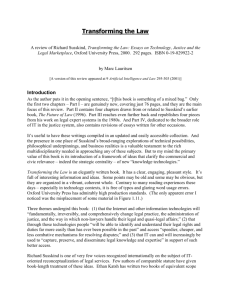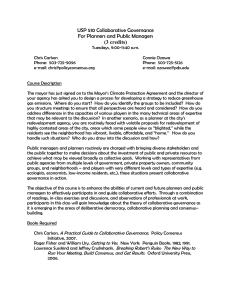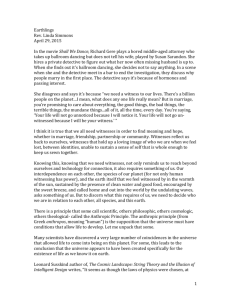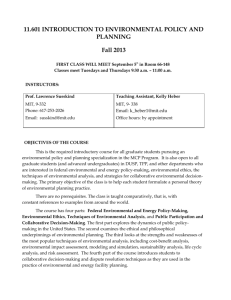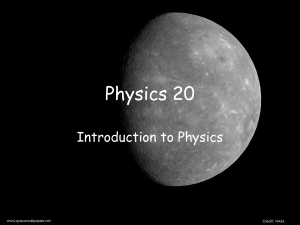ANTHROPIC PRINCIPLE
advertisement
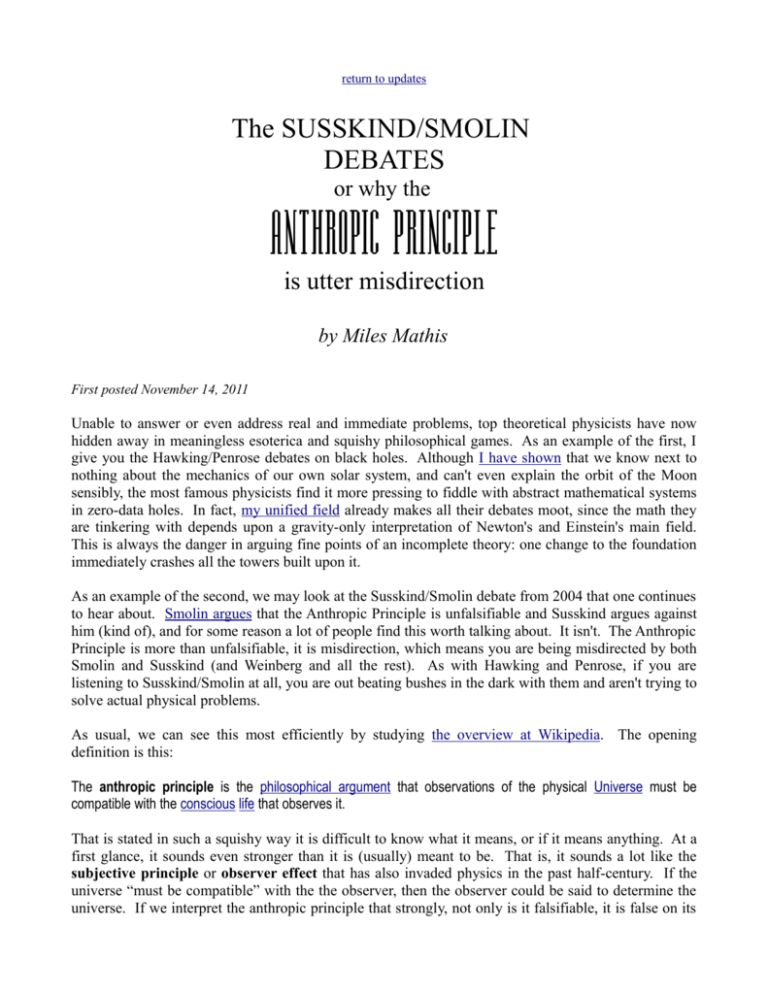
return to updates The SUSSKIND/SMOLIN DEBATES or why the ANTHROPIC PRINCIPLE is utter misdirection by Miles Mathis First posted November 14, 2011 Unable to answer or even address real and immediate problems, top theoretical physicists have now hidden away in meaningless esoterica and squishy philosophical games. As an example of the first, I give you the Hawking/Penrose debates on black holes. Although I have shown that we know next to nothing about the mechanics of our own solar system, and can't even explain the orbit of the Moon sensibly, the most famous physicists find it more pressing to fiddle with abstract mathematical systems in zero-data holes. In fact, my unified field already makes all their debates moot, since the math they are tinkering with depends upon a gravity-only interpretation of Newton's and Einstein's main field. This is always the danger in arguing fine points of an incomplete theory: one change to the foundation immediately crashes all the towers built upon it. As an example of the second, we may look at the Susskind/Smolin debate from 2004 that one continues to hear about. Smolin argues that the Anthropic Principle is unfalsifiable and Susskind argues against him (kind of), and for some reason a lot of people find this worth talking about. It isn't. The Anthropic Principle is more than unfalsifiable, it is misdirection, which means you are being misdirected by both Smolin and Susskind (and Weinberg and all the rest). As with Hawking and Penrose, if you are listening to Susskind/Smolin at all, you are out beating bushes in the dark with them and aren't trying to solve actual physical problems. As usual, we can see this most efficiently by studying the overview at Wikipedia. The opening definition is this: The anthropic principle is the philosophical argument that observations of the physical Universe must be compatible with the conscious life that observes it. That is stated in such a squishy way it is difficult to know what it means, or if it means anything. At a first glance, it sounds even stronger than it is (usually) meant to be. That is, it sounds a lot like the subjective principle or observer effect that has also invaded physics in the past half-century. If the universe “must be compatible” with the the observer, then the observer could be said to determine the universe. If we interpret the anthropic principle that strongly, not only is it falsifiable, it is false on its face. It is so absurd it isn't even worth falsifying. As usual, it is precisely inverted. As a matter of simple logic, it is not the universe that must be compatible with conscious life, it is conscious life that must be compatible with the universe. Only in a culture that had become pathologically anthropomorphic and self-obsessed could the idea that we determine the universe in any way even be floated as an idea. It is analogous to the idea that a goldfish swimming circles in a bowl determines the mental life of the entire household, since he watches it with his little eye. Normally, however, the anthropic principle is stated and held in some variation of its so-called weak form. Many proponents of this weak form admit it is nearly indistinguishable from a tautology, and I would change that to “absolutely indistinguishable.” According to Brandon Carter, we must be prepared to take account of the fact that our location in the universe is necessarily privileged to the extent of being compatible with our existence as observers. That statement has zero content. It actually has less content than a tautology. It is to say that our location is compatible with our existence, which is to say that we exist here. That isn't even a tautology, it is just a truism. A tautology would be in the form of A=A, but here we just have A. “We exist here.” If our location wasn't compatible with our existence, we wouldn't exist here. If the weak form of the “principle” is less than a tautology, what is the strong form? The strong form is variously stated as The Universe is compelled, in some sense, to have conscious life eventually emerge. or There exists one possible Universe designed with the goal of generating and sustaining observers. or Observers are necessary to bring the Universe into being. Regarding the first, we may ask, who is compelling it? We, the observers, can't be compelling it, since in that sentence we the observers haven't emerged yet. How can conscious life which hasn't yet emerged compel itself to emerge? What is the physical mechanism? This is a physical “principle” being discussed by physicists, but they don't appear to require that anything be defined or stated in physical terms. Regarding the second, I have to ask, what kind of scientist thinks that is a scientific sentence? “Designed”? Who designed it? But even if we ditch that one word, the sentence is still a total mess. What if we change it to, There is only one universe that can generate observers. Isn't that way beyond any data set we have, or any possible data set? The only firm data we have that bears on that sentence is this: given—observers, given—universe. None of our other data either tends to confirm or deny that sentence. This is because, as a matter of logic, you would require a complete set of data to confirm or deny that sentence. And you couldn't have a complete set of data until the end of time. Although it is unfalsifiable, we can say that it is false because it is disallowed. It is in the wrong form for a theory or principle, and therefore it is, in a sense, false. Regarding the third, that is clearly the subjective principle I was talking about before. It is even more outrageous than the second form, since it is no longer the universe generating observers, it is now the observers generating the universe. Just study the form of the sentence, please. It is a contradiction. For observers to bring the universe into being, they would have to predate the universe. Since observers are part of the universe by definition, they cannot predate it. It is logically analogous to saying Babies are necessary to bring Mothers into existence, since without babies, women are not Mothers. That is, it looks clever at first, but it is false. Babies don't bring Mothers into existence, they bring the word Mother into existence. As a matter of begetting, the Mother comes first and then the Baby. The Woman was there before the Baby, and would have continued to exist with or without the Baby. Just so the Universe and the Observer. So Smolin is wrong: the anthropic principle is not just falsifiable, it is false. I just falsified it, in both the strong and the weak form. In the weak form, it is “false” because it isn't a principle or even a tautology. As a simple statement, it is not falsifiable because it is a truism. It reduces to something like, “The universe allows us to live here.” Yes it does, as we can see from the fact that we live here. But to claim this is a physical “theory” is a stretch, to say the least. I suppose we could say it is provable, since it proves itself; beyond that it isn't worth discussing. In the strong form, the anthropic principle still isn't a principle or a theory, but we could call it a falsism, since, just as the trusim proves itself, the falsism disproves itself. The first and third forms are contradictions, and the second form is logically disallowed. But if Smolin is wrong, does that make Susskind right? No, since Susskind is arguing that the anthropic principle is true. Smolin: anthropic principle is not falsifiable. Susskind: anthropic principle is falsifiable and true. Correct answer: strong anthropic principle is falsifiable and false; weak anthropic principle is not falsifiable and true. So where does the Susskind/Smolin debate get interesting? Answer: it doesn't. Smolin must have thought he was stating something non-controversial when he told Susskind that the anthropic principle was unfalsifiable, but for some reason Susskind decided to get fussy. We see that Susskind isn't too interested in the anthropic principle, since he quickly leaves it to go elsewhere. It is for this reason that Susskind and Smolin end up arguing past one another. Since in their debate at edge.org they agreed to have only one statement apiece, the whole thing is a wash. All we get from the debate, such as it is, is that Susskind has some animosity toward Smolin, for reasons that don't really come up. What we need to judge this debate is not a physicist, but a psychologist. For example, Susskind is more interested in discussing Steven Weinberg's opinion on the cosmological constant than on his opinion of the anthropic principle. So let us go there for a moment: Steven Weinberg noted that the cosmological constant has a remarkably low value, some 120 orders of magnitude smaller than the value particle physics predicts (this has been described as the "worst prediction in physics"). However, if the cosmological constant were more than about 10 times its observed value, the universe would suffer catastrophic inflation, which would preclude the formation of stars, and hence life. From that gloss at Wiki you can begin to see the Smolin/Susskind debate with a bit more clarity, because Susskind is tied to the inflation figures. That is his field, so he wants the inflation numbers left alone, and wants the cosmological constant at or near zero. Unfortunately, once again my unified field leaves both sides in tatters. To start with, both the inflationary model and the whole idea of the cosmological constant depend on a gravity-only model, which no longer exists. I have shown that we don't have any dark matter, we have charge. That is, the mass gap is filled entirely by photons, which outweigh baryonic matter by 19 to 1. I have also shown that these photons have always been included in the field equations, since Newton's initial gravity equations included charge (hidden within G). Of course this requires us to rephrase all the questions, and throw out all the current answers. Just as there is no dark matter, there is no cosmological constant. The charge field replaces the cosmological constant, and since the photons are not a constant, but have a real presence in the field, this requires a total reassessment of everything. As just a start, the unified field equation varies at different levels of size, since the photon takes up less space in the field at the macro-level than at the quantum level. This means that the unified field equation is itself a variable, and is scale dependent. The current theory of inflation is also destroyed from the ground up, since the unified field gives us new ways to explain the Hubble shifts. What all this means in the context of the anthropic principle debate is that all these parameters that are used to imply necessity are false parameters. As another example, Dicke used the age of the universe and the main sequence to argue that these numbers were pre-established in some way. But since I have shown we have the wrong numbers for just about everything, it is somewhat difficult to argue the old numbers are a necessity. Not only are they not a necessity, they aren't even right. Physicists should have known this even before I came along, since the estimate of the age of the universe has changed since 1961, when Dicke made this statement. It is hard to see how the age of the universe can be both a necessity and an ever-changing value. The fine-structure constant is also used as one of the parameters that is “set” by the necessity to produce conscious life, but I have shown that the status quo don't even know what the fine structure constant is. And once again, it didn't take me to show that, since Feynman admitted it long ago. How can you not know the mechanical significance of a constant, and yet claim it is necessarily preestablished? Before you decide if something is an accident or a necessity, shouldn't you know what it is? But Susskind and Smolin aren't even satisfied with that amount of misdirection. They have to misdirect a debate that was already totally lacking in direction. Although the debate is sold as a debate on the anthropic principle, and Smolin's statements stick at least loosely to that subject, Susskind doesn't even pretend to stay on topic. He starts by attacking Smolin's idea of cosmological natural selection, especially the idea that universes tend to favor production. Although Susskind also believes in cosmological natural selection, he tells us, maximized production can't be right because in the case of eternal inflation it would lead to the prediction that our universe has the maximum possible cosmological constant, since the reproduction rate is nothing but the inflation rate. Wow, is that convoluted thinking! Why is the reproduction rate nothing but the inflation rate? Inflation concerns size, not density, so the universe could be producing any density at any given inflation rate. Not only is the reproduction rate not the inflation rate, but they aren't even necessary functions of one another. This is especially true in a theory such as Smolin's, where the universe is capable of new production from any point. And why assume eternal inflation? Why assume inflation at all? Susskind is just assuming several things, then stacking them to “disprove” maximum production. But why not assume the opposite? Susskind's inflationary model hasn't been proved, it is just wild speculation. Don't misunderstand me, I think Smolin's theory of black hole production is a fantasy, too. Like everything else these guys are saying, it is unfalsifiable. It is just a castle in the air, based on zero data. But Susskind's arguments are even more illogical (and heavyhanded) than Smolin's. Susskind doesn't appear to even be trying to make sense. He appears to be trying to get as far off-topic as fast as he can, and to keep changing the subject with each additional paragraph, so that no one can make heads or tails of what he is saying. Both guys are misdirecting on purpose, but Susskind is a master of this sort of writing, and Smolin can't hope to keep up with him. As another example, why are they even talking about cosmological natural selection? We have no data on that one way or the other, and it is one more manufactured topic. If we were really lacking in solid mechanical problems to discuss, I might understand wasting a few hours asking if Darwinism applied to the cosmos. I don't see that we have enough data to discuss it sensibly, but not all discussions have to be scientific or even sensible. Some things we just do for fun. That said, we are NOT lacking in solid mechanical problems. Therefore it bugs me and should bug you that top physicists cannot seem to act like physicists. They are more interested in being armchair philosophers and shallow pettifoggers than in doing physics or sticking to the point. Since Bohr and Heisenberg outlawed mechanics about 80 years ago, physicists no longer bother trying to be physical. They just sit around and blow smoke and juggle equations and push computer models. We can see this most clearly in Susskind's statement, about midway through, where he veers off into black holes. It is at this point that the Susskind/Smolin debate becomes a subset of the Hawking/Penrose debate, and Susskind/Smolin is now both a squishy philosophical game and meaningless diversion on esoterica. The bottom is first scraped when Susskind says, That raises the question of what exactly is a black hole? One of the deepest lessons that we have learned over the past decade is that there is no fundamental difference between elementary particles and black holes. As repeatedly emphasized by 't Hooft [10][11][12], black holes are the natural extension of the elementary particle spectrum. This is especially clear in string theory where black holes are simply highly excited string states. Does that mean that we should count every particle as a black hole? Susskind needs three footnotes for such drivel? There is no fundamental difference between an electron and a black hole? That is like saying there is no fundamental difference between the Mona Lisa and a lotto ticket (which is also a prominent modern theory). Nothing is too stupid for prominent people to say these days. I get slammed daily for having “non-standard” ideas, but these top physicists at major universities say stuff like this and no one blinks an eye. No fundamental difference between an electron and a black hole? If there is no “fundamental” difference between an electron and a black hole, then there is no “fundamental” difference between anything, and we might as well call every possible object or event a “thingon”. Notice that both Susskind and Smolin have retreated as quickly as they could into arguing about black holes and inflation, two things that are completely theoretical and non-observable. Rather than force one another to be more concrete, as good debaters will do, they encourage one another to be more and more abstract. The “debate” is set up so that they don't even have to respond to one another, they can just sit there and spout off on whatever pops into their heads, with no requirement to make sense. Susskind proves this again when he finishes with another long diversion into black holes, in which he pats himself on the back for his famous debate with Hawking and Gerard 't Hooft. He tells us the trio already solved the question of communication across an event horizon. How did they solve it? Did they tease more data out of the telescopes? Did these three gentlemen fly to the edge of a black hole and drop messages in? No, none of that. They just sat around and blew smoke, re-fudged some old equations, and flipped a coin under the table. But again, since I have had to rewrite important parts of Einstein's field equations, many of their first principles have fallen, including the singularity. Without the singularity, about two-thirds of all the discussions ever discussed on black holes have to be covered in white-out. The psychological reading of this “debate” is that Susskind is pissed because Smolin said “that we know almost nothing about eternal inflation.” Smolin is right, we don't know anything about eternal inflation, but it is sort of like telling Siegfried and Roy they don't know anything about tigers. Susskind doesn't want to hear that, and because Susskind is older and more famous than Smolin, he commences to browbeat him. And Smolin graciously allows him to do so. It doesn't make for much of a conversation, though, does it? Frankly, it is embarrassing to watch, and more for Susskind than for Smolin. We get to the end of it without encountering even one physical statement or one idea that could be called mechanical. It is pathetic that two prominent people could find the time to put such a load of bombast into print, and agree to publish it. To show this once again, let us look at Susskind's last statement, where his heavyhandedness reaches black-hole heaviness. He explains the cosmos in four short paragraphs, the first being In the remote past the universe inflated to an enormous size, many orders of magnitude bigger than the observed portion that we can see. Most of the universe is behind the cosmic horizon and cannot be directly detected. He says he doesn't know anyone who disagrees with that. Maybe he doesn't, but I would say that is the problem. Susskind, like other top physicists, is surrounded by people like Smolin, kissing his hems all day, and doesn't have anyone telling him he is a phony old blowhard who has never done a serious day's worth of physics in his life. String theory isn't physics, it is masturbation. It is unfalsifiable and non-physical. It has set up in a data hole and takes great pains to avoid any contact with the real world. I respect string theorists about as much as I respect art critics. Art critics pretend to be artists and string theorists pretend to be physicists, but no art or physics ever gets done. The same can be said of the inflationary model, which is just a bunch of math thrown up into the air. I have pulled apart the inflationary models from the foundations, showing that they are based on nothing but wish fulfillment. We can see this just from studying Susskind's two sentences above. The second sentence is the perfect example of non-physics, since it purposely hides data. If most of the universe cannot be detected, then most of the proof or disproof of the theory is hidden away forever. That is convenient for the theorists, wouldn't you say? The first sentence is no better, since it is a hypothesis with no evidence. Yes, the theorist can at least point to a few things in this case, but these things he is pointing to can be fit into an almost infinite number of other theories. The only recommendation for the inflationary model is that famous people are promoting it. But if they decided to promote something completely different tomorrow, that new theory would be set in bedrock just as strong, and no one would question it for the same reason. The question you should have for these famous physicists is why they can't seem to address questions that have some data. Why are they so drawn to the edges of the universe and to the first split seconds of time and to the interior of black holes? I will tell you why. Because in the absence of data, they are free to concoct these grandiose mathematical models based on nothing. Nietzsche said, “It is easier to be gigantic than to be beautiful.” In the same way, it is easier to manufacture gigantic abstract theories in physics than it is to solve simple mechanical problems. These guys don't want to look at holes in orbital mechanics or in the Lagrangian or in Einstein's field equations, because those problems require a degree of rigor they cannot manage. The top physicists prefer to exist in some virtual reality where they have complete freedom to propose whatever they like, with no physical constraints. But why do we let them get away with it? Real physicists would have long ago booed Hawking and Penrose off the stage. Real physicists would have read this exchange between Susskind and Smolin and immediately drummed both of them out of the field as imposters. Is there no one left that is embarrassed by what physics and physicists have become? Is there no one left in science to demand that some science get done? In the Edge introduction to the debate, we are told, While this is a conversation written by physicists for physicists, it should nonetheless be of interest for Edge readers as it's in the context of previous Edge features with the authors, it's instructive as to how science is done, and it's a debate that clarifies, not detracts. I would change that to, “It's instructive as to how science fails to get done.” And as to the “clarifying”, you have to be kidding me. These guys have never clarified anything in their lives. Everything they do is done with the express purpose of muddying up all arguments as quickly and thoroughly as possible. Just study the debate: it is one long diversion into evermore abstract and ill-defined proposals. The only method of judging this morass is to stick with the horse you rode in on. Amazingly, Susskind admits this explicitly. He says, All a person like myself can do is to say, "Trust me. I know what I'm doing and he doesn't. And besides, so-and-so agrees with me." Physics by reputation, in other words. I have won more prizes and know more famous people, therefore I am the safer bet. So Susskind proceeds to mention “the incomparable Sidney Coleman and Frank deLuccia.” But he is right: when the arguments have no content, and physics has deflated into this sort of flabby balloon full of bad air, how else can you judge? The debate itself can't even be parsed. It barely rises above gibberish. Best do what Smolin and the editors at Edge do: continue to suck up to Susskind because he sits on more committees and has more resume entries. But of course Susskind has an answer for people like me, and he is careful to put it in his final statement, as a warning. What if someone said everything to do with modern physics was unfalsifiable? From our perspective we would probably laugh at the poor deluded fellow. The correctness of the idea is obvious and who cares if they can falsify it. In other words, physics by fiat and peer pressure. “We don't have to show evidence for anything, you poor deluded fellow. We are at the top of the field. You must believe us not because we have evidence or make sense. You must believe us because if you don't we will laugh at you and make sure you don't get published.” This would be a good time to remind my reader of the famous story of Susskind and Gell-Mann, where they were in an elevator together for a few moments in 1970. Susskind told Gell-Mann about his theory of strings, and Gell-Mann burst into “derisive” laughter. You see that Susskind has come full circle now. Gell-Mann was trying to protect his non-mechanical theories from young upstarts by shaming them into silence. Gell-Mann's laughter was probably not only derisive but uncomfortable, since he recognized in Susskind a competitor—someone who was not afraid to make up theories from nothing, avoiding all data. Laughing usually works, but these guys have other tricks when that fails. Susskind is exactly like the editors at AJP who browbeat me with “physics as self-evident truths.” Here we have physics as something that is “obviously correct.” Things that are obviously correct to top physicists aren't required to have any data or to be internally consistent or to be provable. The ideas are correct simply because they thought of them. Basically, Susskind is saying, “I don't have to obey any rules or even conform to the definition of physics, because I make the rules. Physics is what top physicists say it is. If you don't like that, get out.” Susskind states it outright in this very debate: Good scientific methodology is not an abstract set of rules dictated by philosophers. It is conditioned by, and determined by, the science itself and the scientists who create the science. “Scientific methodology is determined by the scientists who create the science.” Could he be any clearer? So much for Smolin's idea of science as democracy, right? So much for the classical definition of science as theory supported by experiment. Susskind is an authoritarian pig, and he is telling you so right to your face, just in case you missed it. My readers will say, “Wait, didn't you argue against democracy in science? Didn't you say that science was a hierarchy?” Yes, I did, but I never said that those at the top of the field should be free to flout all the rules of science and logic just to suit themselves. Those at the top should be there because they have solved the most problems, doing so in a rigorous manner, not because they were the best at avoiding data. Susskind is pissed in this debate because Smolin challenged him, even though it was a small challenge couched in conciliatory language. You see that is not allowed. People like Susskind are inviolable. They are sanctified, like the Pope. Science is not hierarchical, it is fascist. Fascism is the use of hierarchy for absolute control. Fascism is the use of hierarchy to subvert the normal rules of hierarchy. Yes, everything has rules, even hierarchy. A real or healthy hierarchy is based on real achievements. In physics it should be based on solving real problems. But the current fascism has subverted that hierarchy, replacing it with little dictators like Susskind. Susskind pretends to solve pretend problems, his fellow dictators give him prizes for it, and then the group of them outlaw all criticism. In this way, science has been taken over by pretenders. It is precisely the same thing that has happened in art. Real artists were cleverly defined out of the field, by changing the definition of art. Art was no longer what artists do, art was now what critics and writers and theorists do. So the theorists and critics became the top artists. In science, precisely the same thing happened at almost the same time. With the Copenhagen interpretation, the definition of science was changed to suit those who wished to make it to the top at the time. Instead of being mechanical, it was now mathematical and heuristic. To make the analogy even closer, both art and science have continued to drop conventions or rules. Art has freed itself of all convention, so that now anything may be called art. Science, likewise, is now whatever top scientists say it is, as we have seen with Susskind. He doesn't have to be mechanical or physical, he doesn't have to provide evidence, he doesn't have to be consistent, he doesn't have to address hard data, and most of all he doesn't have to respond to criticism. Science is no longer about surviving criticism. It is about dodging criticism, either by theorizing only about things that can't be criticized—because they have no physical content—or by outlawing criticism. Susskind explicitly dodges Karl Popper at least twice in this current debate, which is instructive. Susskind says that we don't need to bring a heavyweight like Popper into it, which makes us think Susskind has some respect for Popper, but that is just misdirection like the rest. Popper defined science as falsifiability, so Susskind cannot nod politely to Popper and then laugh at “the poor fellow” who thinks Susskind needs to talk scientifically. Susskind is acting like the worst sort of slippery worm here, winking at Popper in front of Smolin, like Uriah Heep winked at David Copperfield, all the while planning to do terrible things to poor Agnes. The poor Agnes here is physics, which Susskind continues to rape behind a cloak with one hand while performing a puppet show with the other hand. Popper's worst fear was the self-deification of people like Susskind, anointing themselves with false unctions and enwrapping themselves in mystifying vapors. That is why he spent years codifying the scientific method. His greatest work was called the Logic of Scientific Discovery. Not the Fascism of Scientific Pronouncement, but the Logic of Scientific Discovery. Unfortunately, the new physics has no use for logic or discovery. It has replaced them entirely with “creativity.” Yes, the new scientists, like everyone else, want to pretend to be artists. Unfortunately for them, science and art have separate definitions. Art is about creativity, among other things, but science is mainly about rigor. Both science and art have been re-defined as a free-for-all, but neither one is. They are each far more rigorous than anyone cares to admit. Susskind also dodges Popper when he says that “scientific methodology isn't a set of rules dictated by philosophers.” In fact, as he shows, scientific methodology is no longer a set of rules at all, or even a methodology. It is an ever changing and ever diminishing set of guidelines the top physicists apply to one another. Yes, physics has become one more “self-regulating body.” Like the bankers, the physicists have found a way to ditch all the old Glass-Steagall Acts, and they now police themselves. We know how that always works out. Susskind gives himself away in almost every paragraph. Near the end, he says, A lot of us did worry that there might be no good way to test inflation. Does he go on to show that they found a way to test inflation, and that it passed those tests? No. He immediately points the finger at creationists, saying they aren't falsifiable either. Brilliant argument, Lenny. What he should have told us is the truth: we worried that there might be no good way to test inflation, but we reminded ourselves that our colleagues don't require any of our models to be provable or even testable. We looked around and saw that people had been getting famous for decades without testing or proving anything, so why should we worry ourselves about that anymore? Amazingly, Susskind does partially tell this truth. He says that quark theory is unfalsifiable, but that everyone has accepted it nonetheless. If the quark guys got famous and got prizes, why shouldn't we? That is sort of like the excuse the bikers give in the Tour de France: hey, everyone else is cheating, we have to cheat, too! To ask us not to do drugs is selective enforcement! Physics has been a free-for-all for 80 years, so how can you start enforcing rules now! It isn't fair! That is what Susskind is really saying. We can't clean up physics now, because it isn't fair to current physicists. They are trying to compete with dead guys like Feynman and Dirac and Pauli, and no one ever fact-checked those guys. Susskind says, But by now, although no single quark has ever been seen in isolation, there is no one who seriously questions the correctness of the quark theory. It is part of the bedrock foundation of modern physics. First of all, I seriously question the correctness of quark theory. I have shown clear evidence it is false. I have falsified it. Second, the Large Hadron Collider is currently falsifying quark theory as we speak, as Susskind should know. The standard model is not holding up, and top physicists are admitting it. Third, Susskind's belief that science is or should be some kind of absolute consensus, that science is composed of various layers of bedrock, is very strange. In the past, science was always composed of competing theories, and scientists nonetheless saw this as healthy. They did not have and did not want “bedrock.” They did not believe in science as “self-evident truths,” or as “obviously correct.” They were happy to have a standing tradition, since that gave them something to work from, but they didn't desire an all-encompassing conformity. But over and over in his posts, Susskind says that “nobody disagrees with this.” If nobody disagrees with it, that does not mean that it is true or confirmed, it means that the opposition is being silenced. People being what they are, there is no theory that will have unanimous consent. If we see unanimous consent, we can be absolutely sure it is manufactured. The lack of real debate we see in physics is the best proof that physics is controlled. The unanimity he points to as a sign of health is the biggest sign of disease. In conclusion, I repeat that the best way to judge a physicist is by looking at the problems he works on. Fake physicists and pretenders gravitate to the data holes, because there they can juggle big equations and use big new terms without ever being inconvenienced by experiments. You won't see them studying mechanical holes in classical equations, as I do, since this is hard work. You won't see them asking or answering why the C-orbit asteroid turns when it approaches the Earth. You won't see them asking or answering why Mars has such low magnetism or why Uranus is on his side. You won't see them tying the fine structure constant to a charge/mass transform, or calculating Planck's constant from the Dalton, or explaining the Metonic Cycle, or explaining the mechanical significance of G, or solving the vacuum catastrophe, because these things require rigor. They require working within definite constraints, and answering longstanding facts. You will see them discussing black holes, the first few seconds of the universe, dark matter, other dimensions, wormholes, inflation, exotic cosmologies, multiverses, time reversal, quantum entanglement, superposition, the big bang, the cosmological constant, virtual particles, vacuum energy, bosons, and anything else they think is poorly defined or understood. Anywhere there is a big mystery they will set up camp and begin blowing a steady stream of hot air. They will pull out their huge bags of mathematical fudges and begin constructing their edifices in the sky. Once they have glued a few wobbly sticks together, they will begin giving eachother prizes and talking to the magazines. The saddest part of this whole charade is that it is these pretenders who now sits in all the top chairs at all the top universities. As in art, the usurpers have taken over the throne rooms, and they now control the field. And, again as in art, they have proven to be very hard to dislodge or overthrow. They have been entrenching themselves for almost a century, and they have fortified all points of entry. However, they are not invulnerable. On the contrary, they are very vulnerable, which is why they are so keen to prevent even the smallest sign of revolt. It is why we see Susskind coming down on Smolin, and why we see any peep from the ranks immediately squelched, either by demotion or group censure. It is why outsiders like me are treated to a constant chorus of slander. The rank and file must be warned not to listen to us. We are the sowers of the seeds of discontent, the fomenters of revolution. Mainstream scientists may hear our siren call of sensible sentences and equations, and bolt. To prevent this, the chains are shortened and tightened, and we see Susskind shortening and tightening various chains in this debate. He is warning his inferiors not to cross him. He has friends in high places. He does not have to answer to philosophers or to his students or to any methodology. He is like Nixon when cornered: I don't have to answer your subpeonas, I am sovereign, I am king. But I have this to say to mainstream physicists: your chains are illusory. The threats from the top have always been bluster. As in any other field, the rank and file have the power to throw off their oppressors, if they have the guts to wield that power. These top physicists exist wholly on prestige, a prestige that is freely given them by you in the field. If you decide as a group to withhold that prestige, the masters will not last a week. Therefore it is time to literally boo these people off the stage. They have destroyed your field. Physics departments are being cut all over the country, and it isn't only because of the recession. It is because we as a people don't have any more time and money to waste on black hole debates, or on debates about the anthropic principle. If we are to continue to fund and teach physics, we need physicists to solve some real problems.
